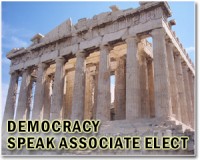| . |  |
. |
Saint Petersburg (AFP) June 20, 2010 In a project of dizzying ambition, Tsar Peter the Great founded Saint Petersburg on a mosquito-ridden swamp to serve as Russia's window on the West and close its economic gap with Europe. Over three centuries later, Russia's third post-Soviet President Dmitry Medvedev chose Saint Petersburg this week for a key address to convince the world that Russia was changing into an modern, competitive state. In the city famed for its canals and stunning classical architecture, Medvedev outlined his plan to modernize Russia into an innovation-based economy, attracting people from around the world to "realise their dreams". The president has made modernization and economic reform mantras of his two years in power but participants at the forum said it was time to see the results of the promises. Russia remains blighted by corruption and a legal system that often unfairly penalises private business while its economy remains dangerously dependent on its oil and gas exports. "What has changed is the discussion. But there has been very little reform as yet," said Anders Aslund, senior fellow at the Peterson Institute for International Economics. "Russia has excellent fiscal policies and bad structural policies. There has been no structural reform since 2002," he added. Klaus Mangold, head of German industry's Eastern Committee, said Russia could not continue to sustain its population of over 140 million on a raw-materials based economy alone. "It needs to look at how to manufacture products," he said, noting that a colossal 85 percent of Russia's exports to Germany were of raw materials. Medvedev has also come under criticism for championing economic reform while doing little to increase freedoms in Russia's often monotone political landscape. In an action that clashed with the forum's emphasis on modernisation, police in Saint Petersburg seized 1,000 copies of a pamphlet critical of Prime Minister Vladimir Putin's decade at the summit of Russian politics. They also arrested five people for distributing it outside the forum grounds, although opposition activists said they later managed to hand out 2,000 copies in the city centre. Dmitry Trenin, director of the Carnegie Moscow Center, warned against a narrow focus on just economic innovation, saying political changes were required if full modernisation was to be realised. "Social-political changes are needed. The decision has to be taken, perhaps it will be after the election," he said, referring to Russia's next presidential polls in 2012. Whereas Peter built his capital to forge a path to the West, many experts believe Russia in the 21st century must look as much to successful Asian economies in the East. Sergei Guriev, rector of the New Economic School, said Russia could be drawing inspiration from South Korea over how to rapidly build a technology-based booming economy. "Unfortunately Russia bears no resemblance to South Korea now or even South Korea 20 years ago," he said. "But if the problems of corruption and bureaucracy can be solved there is no reason why Russia in 2020 cannot become a flourishing country like South Korea." Two-thirds of Russia's territory lies in Asia and the country's dual Europe-Asia orientation is symbolized in its double-headed eagle, now restored as the national emblem after Soviet times. Deputy Prime Minister Sergei Ivanov said Russia had no need to make an "artificial choice" between East and West. "The double-headed eagle makes this clear enough." "We have strong and weak sides. The weak sides: low and uncompetitive labour productivity. Energy wastage of the economy is huge," said Ivanov. Like Peter the Great, Medvedev also has a flagship modernisation project -- the construction of a Russian Silicon Valley in Skolkovo near Moscow to serve as a hub for innovation in Russia. The scheme was proudly touted at the forum and its co-chairman Viktor Vekselberg said deals would be signed with foreign firms ranging from Boeing to Nokia to Yahoo.
Share This Article With Planet Earth
Related Links Democracy in the 21st century at TerraDaily.com
 Dutch face lengthy coalition talks
Dutch face lengthy coalition talksThe Hague, Netherlands (UPI) Jun 10, 2010 The Netherlands faces months of tough coalition talks after voters punished the government, helped no single party to a clear majority but gave an unwanted far-right group a surge in support. On Thursday, Dutch voters woke up to a political deadlock after the parliamentary elections. The Liberal Party, which campaigned for budget austerity in times of an economic crisis, won 31 ... read more |
|
| The content herein, unless otherwise known to be public domain, are Copyright 1995-2010 - SpaceDaily. AFP and UPI Wire Stories are copyright Agence France-Presse and United Press International. ESA Portal Reports are copyright European Space Agency. All NASA sourced material is public domain. Additional copyrights may apply in whole or part to other bona fide parties. Advertising does not imply endorsement,agreement or approval of any opinions, statements or information provided by SpaceDaily on any Web page published or hosted by SpaceDaily. Privacy Statement |